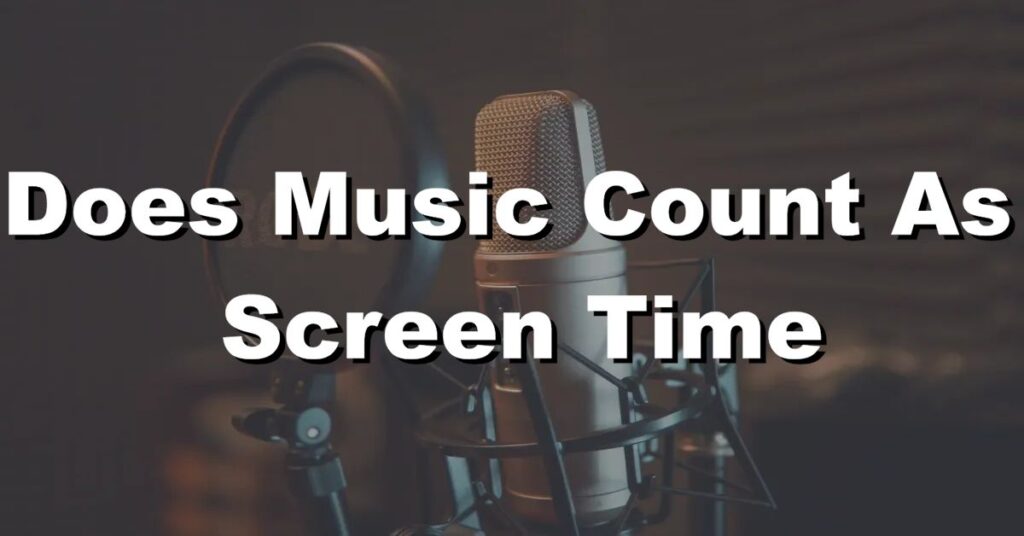With the increasing amount of time that people spend consuming media, it’s important to understand what counts as “screen time.”
In this article, we’ll discuss the definition of screen time, whether or not listening to music counts, and how to balance our consumption of media for a healthy lifestyle.
The Effects of Screen Time on Music Consumption
The increasing prevalence of screens in our daily lives has had a significant impact on how we consume music. With the rise of streaming platforms and digital music libraries, music has become easily accessible and often consumed through screens, such as smartphones, tablets, and computers.
This shift in music consumption habits has both positive and negative effects. On one hand, screens offer convenience, allowing us to discover, access, and explore a vast array of music with just a few clicks. They also provide visual elements, such as album covers, music videos, and artist interviews, enhancing the overall music experience.
However, excessive screen time spent on music consumption can lead to potential drawbacks, such as reduced attention and engagement with the music itself, increased distractions, and a tendency to multitask, which may diminish the immersive and mindful aspects of music listening.
Is Listening to Music Really the Same as Watching TV?
While both listening to music and watching TV involve engaging with audiovisual content, they offer distinct experiences and serve different purposes. Listening to music primarily focuses on the auditory aspect, allowing individuals to connect with the emotional and artistic elements of the music itself. It encourages active listening, interpretation, and personal reflection.
In contrast, watching TV involves a combination of visual storytelling, dialogue, and sound effects, often presenting a narrative or visual experience.
Although both activities can be enjoyable and provide entertainment, they engage different cognitive processes and evoke different responses. It is important to recognize and appreciate the unique qualities of each medium while considering our consumption habits and intentions.
The Impact of Technology on the Way We Consume Music
Technological advancements have revolutionized the way we consume music. The advent of digital music formats, online streaming services, and portable devices has made music more accessible and personalized than ever before.
With the ability to create customized playlists, discover new artists and genres, and access music on-the-go, technology has broadened our musical horizons and empowered individual music choices.
However, this shift has also brought challenges, such as the devaluation of music due to free or low-cost streaming models, issues of artist compensation, and the potential for algorithmic bias in music recommendations.
Technology has fundamentally reshaped the music industry and the ways in which artists and listeners interact, highlighting the need for ongoing discussions about fair compensation, artistic integrity, and the preservation of music’s cultural and economic value.
Balancing Screen Time and Music in a Digital World
In a digital world where screens are prevalent, finding a balance between screen time and music consumption is essential. While screens offer convenience and additional visual elements, it is important to allocate dedicated time for focused music listening experiences that prioritize active engagement and appreciation for the music itself.
Creating a mindful environment, free from distractions, can enhance the emotional and intellectual connection with the music.
Additionally, exploring alternative ways to consume music, such as attending live performances, engaging in communal listening experiences, or dedicating time for offline music enjoyment, can help restore a sense of balance and deepen the connection with the art form.
Does the Way We Consume Music Change Its Meaning and Value?
The way we consume music undoubtedly influences our perception of its meaning and value. With the ease of accessing and streaming music through screens, there is a risk of treating music as a background commodity rather than an immersive and intentional experience.
This shift in consumption habits may impact how we engage with the emotional depth, artistic nuances, and cultural significance of music. However, it is important to remember that the inherent value of music lies in its ability to evoke emotions, inspire creativity, foster connections, and provide a platform for personal expression.
By actively seeking meaningful and intentional music experiences, valuing the artistic craftsmanship, and embracing diverse music genres and styles, we can maintain the rich meaning and transformative power of music in our lives.
Conclusion
In conclusion, listening to music does not count as screen time, as it does not involve looking at a screen or a device. However, if you are streaming music online or using an app, it may be considered screen time if it involves using a device.
It’s essential to limit screen time and make time for other activities like listening to music, reading books, or spending time outdoors.

